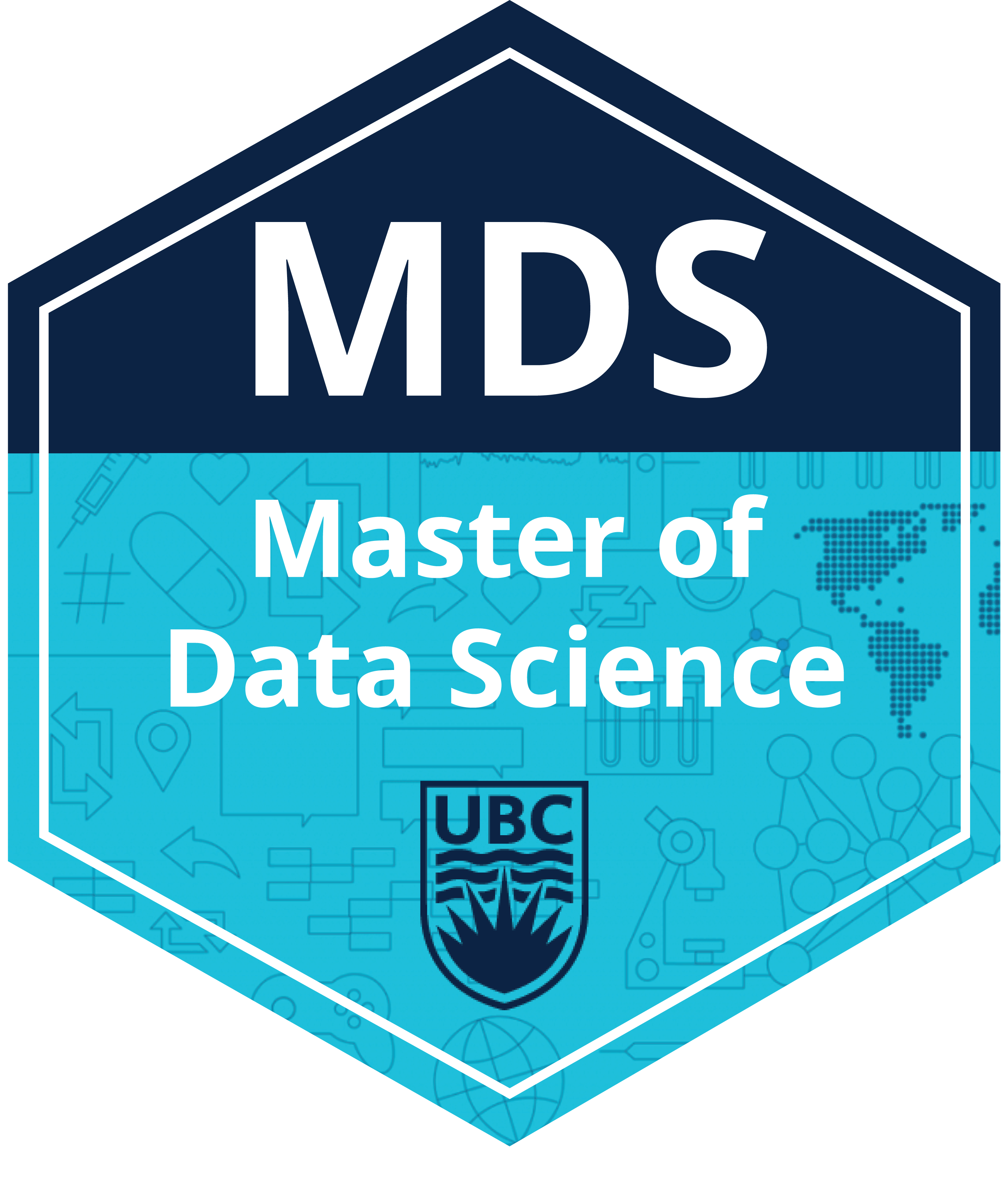
Course Introduction#
UBC Master of Data Science program, 2023-24
Instructor: Varada Kolhatkar
Imports#
import numpy as np
import pandas as pd
import matplotlib.pyplot as plt
import os
import sys
sys.path.append(os.path.join(os.path.abspath(""), "code"))
from IPython.display import HTML, display
from sklearn.feature_extraction.text import CountVectorizer
from sklearn.linear_model import LogisticRegression
from sklearn.model_selection import train_test_split
from sklearn.pipeline import make_pipeline
plt.rcParams["font.size"] = 16
pd.set_option("display.max_colwidth", 200)
Learning outcomes#
From this lecture, you will be able to
explain the motivation to study machine learning;
explain supervised machine learning;
navigate through the course material;
be familiar with the policies and how the class is going to run;
Characters in this course?#
DSCI 571 teaching staff (me, the TAs, and our co-ordinator, Betty Zhao)
Eva (a fictitious enthusiastic student)
And you all, of course 🙂!
Meet your instructor#

I am Varada Kolhatkar [ʋəɾəda kɔːlɦəʈkər]
You can call me Varada. If Varada is hard for you, you can call me V or Ada.
I am an Assistant Professor of Teaching in Computer Science.
I did my Ph.D. in Computational Linguistics at the University of Toronto.
I’ve been teaching for MDS since October 2018.
I will be teaching you four machine learning courses.
Contact information
Email: kvarada@cs.ubc.ca
Office: ICCS 237
Meet 571 TAs#
Armin Saadat Boroujeni
Daniel Ramandi
Faeze Keshavarz
Md Shahriar Rahim Siddiqui
Negar Sadrzadeh
Prajeet Bajpai
Meet Eva (a fictitious persona)!#

Eva is among one of you. She has some experience in Python programming. She knows machine learning as a buzz word. During her recent internship, she has developed some interest and curiosity in the field. She wants to learn what is it and how to use it. She is a curious person and usually has a lot of questions!
You all#
Since we’re going to spend the next 10 months with each other, I would like to know you a bit better.
Please fill out Getting to know you survey when you get a chance.
Attention!!
You are welcome to ask questions by raising your hand. There is also a reflection Google Document for this course for your questions/comments/reflections. It will be great if you can write about your takeaways, struggle points, and general comments in this document so that I’ll try to address those points in the next lecture.
Why machine learning (ML)? [video]#
See also
Check out the accompanying video on this material.
Prevalence of ML#
Let’s look at some examples.
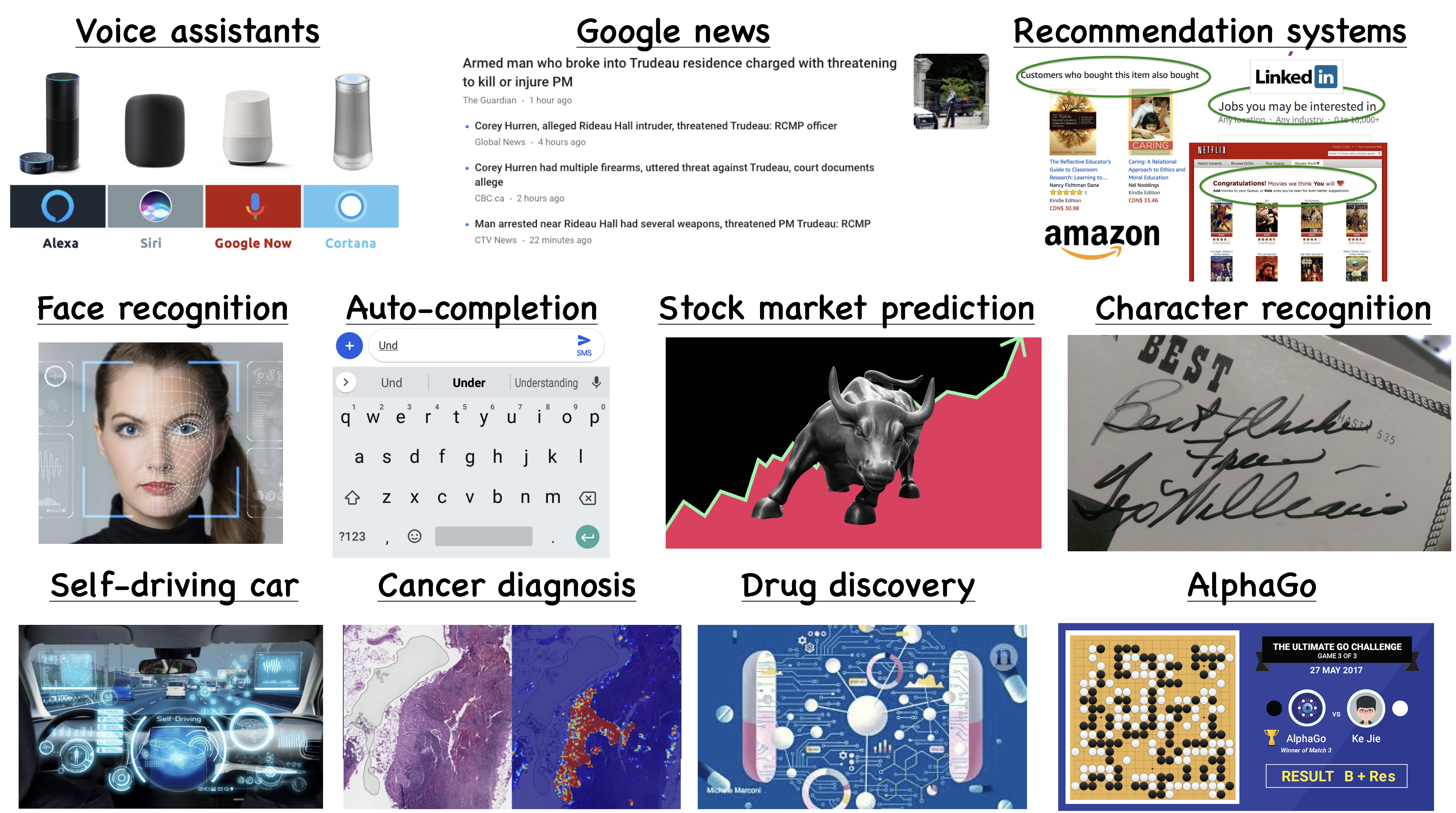
Saving time and scaling products#
Imagine writing a program for spam identification, i.e., whether an email is spam or non-spam.
Traditional programming
Come up with rules using human understanding of spam messages.
Time consuming and hard to come up with robust set of rules.
Machine learning
Collect large amount of data of spam and non-spam emails and let the machine learning algorithm figure out rules.
With machine learning, you’re likely to
Save time
Customize and scale products
Supervised machine learning#
Types of machine learning#
Here are some typical learning problems.
Supervised learning (Gmail spam filtering)
Training a model from input data and its corresponding targets to predict targets for new examples.
Unsupervised learning (Google News)
Training a model to find patterns in a dataset, typically an unlabeled dataset.
Reinforcement learning (AlphaGo)
A family of algorithms for finding suitable actions to take in a given situation in order to maximize a reward.
Recommendation systems (Amazon item recommendation system)
Predict the “rating” or “preference” a user would give to an item.
What is supervised machine learning (ML)?#
Training data comprises a set of observations (\(X\)) and their corresponding targets (\(y\)).
We wish to find a model function \(f\) that relates \(X\) to \(y\).
We use the model function to predict targets of new examples.
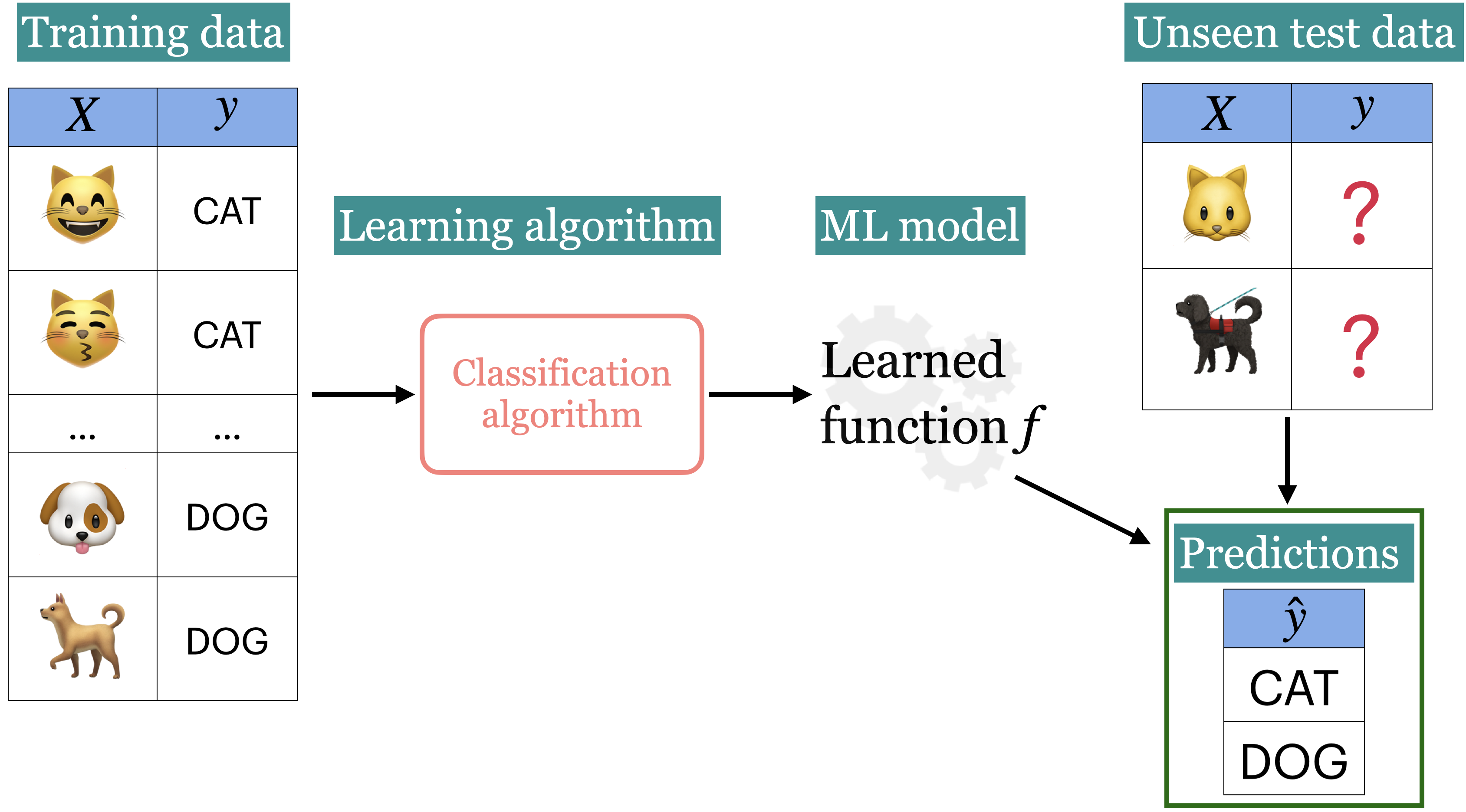
Example: Predict whether a message is spam or not#
Input features \(X\) and target \(y\)#
Note
Do not worry about the code and syntax for now.
Note
Download SMS Spam Collection Dataset from here.
Training a supervised machine learning model with \(X\) and \(y\)#
Show code cell source
sms_df = pd.read_csv("data/spam.csv", encoding="latin-1")
sms_df = sms_df.drop(columns = ["Unnamed: 2", "Unnamed: 3", "Unnamed: 4"])
sms_df = sms_df.rename(columns={"v1": "target", "v2": "sms"})
train_df, test_df = train_test_split(sms_df, test_size=0.10, random_state=42)
HTML(train_df.head().to_html(index=False))
---------------------------------------------------------------------------
FileNotFoundError Traceback (most recent call last)
Cell In[2], line 1
----> 1 sms_df = pd.read_csv("data/spam.csv", encoding="latin-1")
2 sms_df = sms_df.drop(columns = ["Unnamed: 2", "Unnamed: 3", "Unnamed: 4"])
3 sms_df = sms_df.rename(columns={"v1": "target", "v2": "sms"})
File ~/miniconda3/envs/571/lib/python3.10/site-packages/pandas/io/parsers/readers.py:948, in read_csv(filepath_or_buffer, sep, delimiter, header, names, index_col, usecols, dtype, engine, converters, true_values, false_values, skipinitialspace, skiprows, skipfooter, nrows, na_values, keep_default_na, na_filter, verbose, skip_blank_lines, parse_dates, infer_datetime_format, keep_date_col, date_parser, date_format, dayfirst, cache_dates, iterator, chunksize, compression, thousands, decimal, lineterminator, quotechar, quoting, doublequote, escapechar, comment, encoding, encoding_errors, dialect, on_bad_lines, delim_whitespace, low_memory, memory_map, float_precision, storage_options, dtype_backend)
935 kwds_defaults = _refine_defaults_read(
936 dialect,
937 delimiter,
(...)
944 dtype_backend=dtype_backend,
945 )
946 kwds.update(kwds_defaults)
--> 948 return _read(filepath_or_buffer, kwds)
File ~/miniconda3/envs/571/lib/python3.10/site-packages/pandas/io/parsers/readers.py:611, in _read(filepath_or_buffer, kwds)
608 _validate_names(kwds.get("names", None))
610 # Create the parser.
--> 611 parser = TextFileReader(filepath_or_buffer, **kwds)
613 if chunksize or iterator:
614 return parser
File ~/miniconda3/envs/571/lib/python3.10/site-packages/pandas/io/parsers/readers.py:1448, in TextFileReader.__init__(self, f, engine, **kwds)
1445 self.options["has_index_names"] = kwds["has_index_names"]
1447 self.handles: IOHandles | None = None
-> 1448 self._engine = self._make_engine(f, self.engine)
File ~/miniconda3/envs/571/lib/python3.10/site-packages/pandas/io/parsers/readers.py:1705, in TextFileReader._make_engine(self, f, engine)
1703 if "b" not in mode:
1704 mode += "b"
-> 1705 self.handles = get_handle(
1706 f,
1707 mode,
1708 encoding=self.options.get("encoding", None),
1709 compression=self.options.get("compression", None),
1710 memory_map=self.options.get("memory_map", False),
1711 is_text=is_text,
1712 errors=self.options.get("encoding_errors", "strict"),
1713 storage_options=self.options.get("storage_options", None),
1714 )
1715 assert self.handles is not None
1716 f = self.handles.handle
File ~/miniconda3/envs/571/lib/python3.10/site-packages/pandas/io/common.py:863, in get_handle(path_or_buf, mode, encoding, compression, memory_map, is_text, errors, storage_options)
858 elif isinstance(handle, str):
859 # Check whether the filename is to be opened in binary mode.
860 # Binary mode does not support 'encoding' and 'newline'.
861 if ioargs.encoding and "b" not in ioargs.mode:
862 # Encoding
--> 863 handle = open(
864 handle,
865 ioargs.mode,
866 encoding=ioargs.encoding,
867 errors=errors,
868 newline="",
869 )
870 else:
871 # Binary mode
872 handle = open(handle, ioargs.mode)
FileNotFoundError: [Errno 2] No such file or directory: 'data/spam.csv'
X_train, y_train = train_df["sms"], train_df["target"]
X_test, y_test = test_df["sms"], test_df["target"]
clf = make_pipeline(CountVectorizer(max_features=5000), LogisticRegression(max_iter=5000))
clf.fit(X_train, y_train);
Predicting on unseen data using the trained model#
pd.DataFrame(X_test[0:4])
| sms | |
|---|---|
| 3245 | Funny fact Nobody teaches volcanoes 2 erupt, tsunamis 2 arise, hurricanes 2 sway aroundn no 1 teaches hw 2 choose a wife Natural disasters just happens |
| 944 | I sent my scores to sophas and i had to do secondary application for a few schools. I think if you are thinking of applying, do a research on cost also. Contact joke ogunrinde, her school is one m... |
| 1044 | We know someone who you know that fancies you. Call 09058097218 to find out who. POBox 6, LS15HB 150p |
| 2484 | Only if you promise your getting out as SOON as you can. And you'll text me in the morning to let me know you made it in ok. |
Note
Do not worry about the code and syntax for now.
pred_dict = {
"sms": X_test[0:4],
"spam_predictions": clf.predict(X_test[0:4]),
}
pred_df = pd.DataFrame(pred_dict)
pred_df.style.set_properties(**{"text-align": "left"})
| sms | spam_predictions | |
|---|---|---|
| 3245 | Funny fact Nobody teaches volcanoes 2 erupt, tsunamis 2 arise, hurricanes 2 sway aroundn no 1 teaches hw 2 choose a wife Natural disasters just happens | ham |
| 944 | I sent my scores to sophas and i had to do secondary application for a few schools. I think if you are thinking of applying, do a research on cost also. Contact joke ogunrinde, her school is one me the less expensive ones | ham |
| 1044 | We know someone who you know that fancies you. Call 09058097218 to find out who. POBox 6, LS15HB 150p | spam |
| 2484 | Only if you promise your getting out as SOON as you can. And you'll text me in the morning to let me know you made it in ok. | ham |
We have accurately predicted labels for the unseen text messages above!
(Supervised) machine learning: popular definition#
A field of study that gives computers the ability to learn without being explicitly programmed.
-- Arthur Samuel (1959)
ML is a different way to think about problem solving.
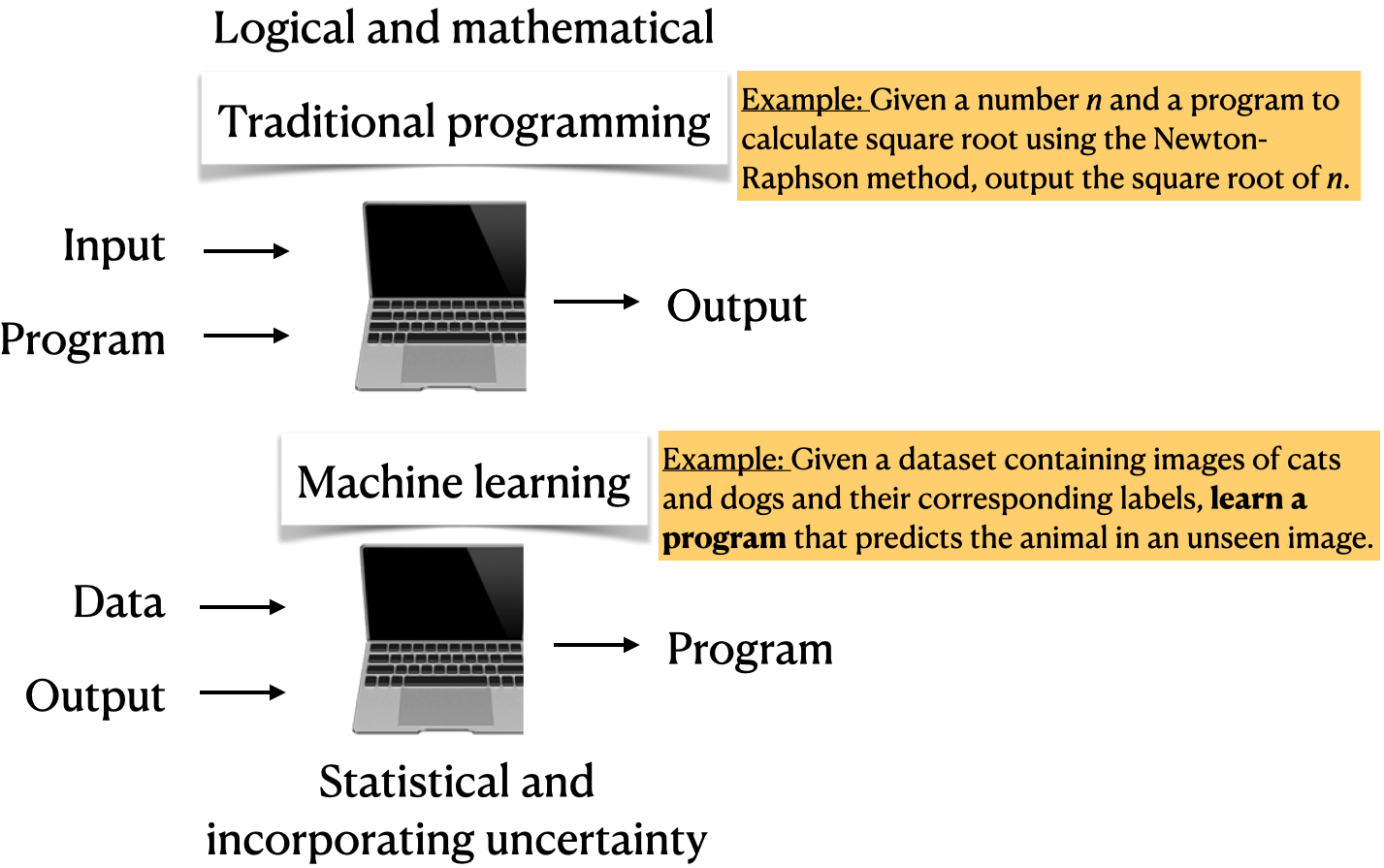
Examples#
Let’s look at some concrete examples of supervised machine learning.
Note
Do not worry about the code at this point. Just focus on the input and output in each example.
Example 1: Predicting whether a patient has a liver disease or not#
Input data#
Suppose we are interested in predicting whether a patient has the disease or not. We are given some tabular data with inputs and outputs of liver patients, as shown below. The data contains a number of input features and a special column called “Target” which is the output we are interested in predicting.
Note
Download the data from here.
Note
Download the data from here.
Show code cell source
df = pd.read_csv("data/indian_liver_patient.csv")
df = df.drop(columns = ["Gender"])
df["Dataset"] = df["Dataset"].replace(1, "Disease")
df["Dataset"] = df["Dataset"].replace(2, "No Disease")
df.rename(columns={"Dataset": "Target"}, inplace=True)
train_df, test_df = train_test_split(df, test_size=4, random_state=42)
HTML(train_df.head().to_html(index=False))
| Age | Total_Bilirubin | Direct_Bilirubin | Alkaline_Phosphotase | Alamine_Aminotransferase | Aspartate_Aminotransferase | Total_Protiens | Albumin | Albumin_and_Globulin_Ratio | Target |
|---|---|---|---|---|---|---|---|---|---|
| 40 | 14.5 | 6.4 | 358 | 50 | 75 | 5.7 | 2.1 | 0.50 | Disease |
| 33 | 0.7 | 0.2 | 256 | 21 | 30 | 8.5 | 3.9 | 0.80 | Disease |
| 24 | 0.7 | 0.2 | 188 | 11 | 10 | 5.5 | 2.3 | 0.71 | No Disease |
| 60 | 0.7 | 0.2 | 171 | 31 | 26 | 7.0 | 3.5 | 1.00 | No Disease |
| 18 | 0.8 | 0.2 | 199 | 34 | 31 | 6.5 | 3.5 | 1.16 | No Disease |
Building a supervise machine learning model#
Let’s train a supervised machine learning model with the input and output above.
from lightgbm.sklearn import LGBMClassifier
X_train = train_df.drop(columns=["Target"])
y_train = train_df["Target"]
X_test = test_df.drop(columns=["Target"])
y_test = test_df["Target"]
model = LGBMClassifier(random_state=123, verbose=-1)
model.fit(X_train, y_train)
LGBMClassifier(random_state=123, verbose=-1)In a Jupyter environment, please rerun this cell to show the HTML representation or trust the notebook.
On GitHub, the HTML representation is unable to render, please try loading this page with nbviewer.org.
LGBMClassifier(random_state=123, verbose=-1)
Model predictions on unseen data#
Given features of new patients below we’ll use this model to predict whether these patients have the liver disease or not.
HTML(X_test.reset_index(drop=True).to_html(index=False))
| Age | Total_Bilirubin | Direct_Bilirubin | Alkaline_Phosphotase | Alamine_Aminotransferase | Aspartate_Aminotransferase | Total_Protiens | Albumin | Albumin_and_Globulin_Ratio |
|---|---|---|---|---|---|---|---|---|
| 19 | 1.4 | 0.8 | 178 | 13 | 26 | 8.0 | 4.6 | 1.30 |
| 12 | 1.0 | 0.2 | 719 | 157 | 108 | 7.2 | 3.7 | 1.00 |
| 60 | 5.7 | 2.8 | 214 | 412 | 850 | 7.3 | 3.2 | 0.78 |
| 42 | 0.5 | 0.1 | 162 | 155 | 108 | 8.1 | 4.0 | 0.90 |
pred_df = pd.DataFrame({"Predicted_target": model.predict(X_test).tolist()})
df_concat = pd.concat([pred_df, X_test.reset_index(drop=True)], axis=1)
HTML(df_concat.to_html(index=False))
| Predicted_target | Age | Total_Bilirubin | Direct_Bilirubin | Alkaline_Phosphotase | Alamine_Aminotransferase | Aspartate_Aminotransferase | Total_Protiens | Albumin | Albumin_and_Globulin_Ratio |
|---|---|---|---|---|---|---|---|---|---|
| No Disease | 19 | 1.4 | 0.8 | 178 | 13 | 26 | 8.0 | 4.6 | 1.30 |
| Disease | 12 | 1.0 | 0.2 | 719 | 157 | 108 | 7.2 | 3.7 | 1.00 |
| Disease | 60 | 5.7 | 2.8 | 214 | 412 | 850 | 7.3 | 3.2 | 0.78 |
| Disease | 42 | 0.5 | 0.1 | 162 | 155 | 108 | 8.1 | 4.0 | 0.90 |
Example 2: Predicting the label of a given image#
Suppose you want to predict the label of a given image using supervised machine learning. We are using a pre-trained model here to predict labels of new unseen images.
Note
Assuming that you have successfully created 571 conda environment on your computer, you’ll have to install torchvision in 571 conda environment to run the following code. If you are unable to install torchvision on your laptop, please don’t worry at this point. It’s not crucial at this point.
conda activate 571 conda install -c pytorch torchvision
import img_classify
from PIL import Image
import glob
import matplotlib.pyplot as plt
# Predict topn labels and their associated probabilities for unseen images
images = glob.glob("data/test_images/*.*")
class_labels_file = 'data/imagenet_classes.txt'
for img_path in images:
img = Image.open(img_path).convert('RGB')
img.load()
plt.imshow(img)
plt.show();
df = img_classify.classify_image(img_path, class_labels_file)
print(df.to_string(index=False))
print("--------------------------------------------------------------")
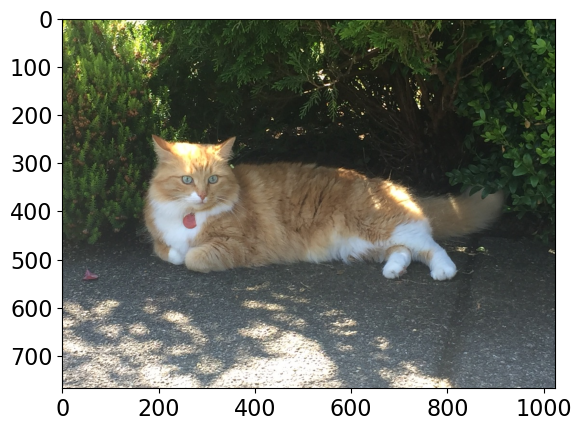
Class Probability score
tiger cat 0.636
tabby, tabby cat 0.174
Pembroke, Pembroke Welsh corgi 0.081
lynx, catamount 0.011
--------------------------------------------------------------
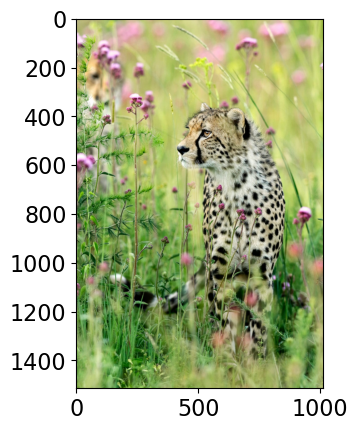
Class Probability score
cheetah, chetah, Acinonyx jubatus 0.994
leopard, Panthera pardus 0.005
jaguar, panther, Panthera onca, Felis onca 0.001
snow leopard, ounce, Panthera uncia 0.000
--------------------------------------------------------------
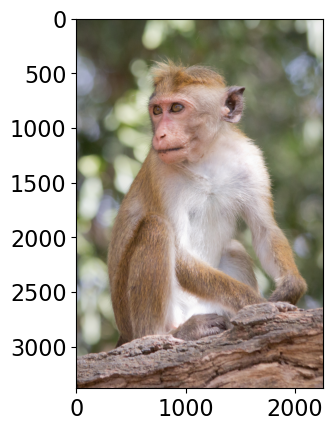
Class Probability score
macaque 0.885
patas, hussar monkey, Erythrocebus patas 0.062
proboscis monkey, Nasalis larvatus 0.015
titi, titi monkey 0.010
--------------------------------------------------------------
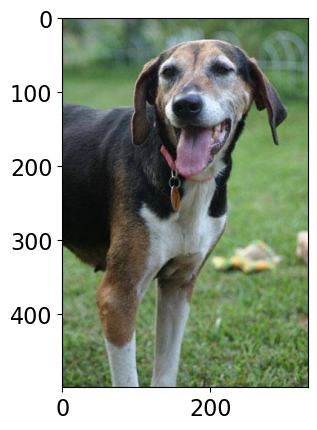
Class Probability score
Walker hound, Walker foxhound 0.582
English foxhound 0.144
beagle 0.068
EntleBucher 0.059
--------------------------------------------------------------
Example 3: Predicting sentiment expressed in a movie review#
Suppose you are interested in predicting whether a given movie review is positive or negative. You can do it using supervised machine learning.
Note
Download the data from here.
Show code cell source
imdb_df = pd.read_csv("data/imdb_master.csv", encoding="ISO-8859-1")
imdb_df = imdb_df[imdb_df["label"].str.startswith(("pos", "neg"))]
imdb_df = imdb_df.drop(columns = ["Unnamed: 0", "type", "file"])
imdb_df.rename(columns={"label": "target"}, inplace=True)
train_df, test_df = train_test_split(imdb_df, test_size=0.10, random_state=123)
HTML(train_df.head().to_html(index=False))
| review | target |
|---|---|
| It may have been inevitable that with the onslaught of "slasher" movies in the early 1980's, that a few good ones might slip through the cracks. This is a great "rare" film from Jeff Lieberman, who insured his cult status with his memorable 1970's films "Squirm" and "Blue Sunshine".<br /><br />Five young people head into the Oregon mountains (this movie was actually shot on location) to do some camping and check out the deed to some land that one of them has acquired. Before long, they will predictably be terrorized by a bulky killer with an incredibly creepy wheezing laugh.<br /><br />"Just Before Dawn" is noticeably more ambitious, "arty", and intelligent than some slasher films. Lieberman actually fleshes out the characters - well, two of them, anyway - as much as a 90-minute-long film will allow him. The film has genuine moments of suspense and tension, and actually refrains from graphic gore, save for one killing right at the beginning.<br /><br />There is an above-average cast here, including Oscar winner George Kennedy, as a forest ranger who's understandably gone a little flaky from having been alone in the wilderness for too long. Jack Lemmon's son Chris, future Brian De Palma regular Gregg Henry, blonde lead Deborah Benson (it's too bad she hasn't become a more well-known performer, judging by her work here), Ralph Seymour ("Ghoulies"), Mike Kellin ("Sleepaway Camp"), and Jamie Rose ("Chopper Chicks in Zombietown") round out the cast.<br /><br />Some of the shots are interesting, and the early music score by Brad Feidel (now best known for his "Terminator" theme) is haunting and atmospheric.<br /><br />This is worth catching for the important plot twist at about the one hour mark, although a moment at about 75 minutes in involving the heroine and a tree and the killer is almost comical; it may actually remind a viewer of a cartoon! One of the most clever touches is the final dispatching of the killer, which I'd never seen before in a horror film and probably won't see again.<br /><br />I didn't give it 10 out of 10 because I can't honestly that I was that frightened. Still, it's an interesting slasher that is worthy of re-discovery.<br /><br />"That deed don't mean nothing, son. Those mountains can't read."<br /><br />9/10 | pos |
| Tell the truth Iâ??m a bit stun to see all these positive review by so many people, which is also the main reason why I actually decide to see this movie. And after having seen it, I was really a disappointed, and this comes from the guy that loves this genre of movie.<br /><br />Iâ??m surprise at this movie all completely â?? it is like a kidâ??s movie with nudity for absolutely no reason and it all involve little children cursing and swearing. Iâ??m not at all righteous but this has really gone too far in my account.<br /><br />Synopsis: The story about two guys got send to the big brother program for their reckless behavior. There they met up with one kids with boobs obsession and the other is a medieval freak.<br /><br />Just the name it self is not really connected with the story at all. They are not being a role model and or do anything but to serve their time for what they have done. The story is very predictable (though expected) and the humor is lame. And havenâ??t we already seen the same characters (play by Mc Lovinâ??) in so many other movies (like Sasquatch Gang?). I think I laugh thrice and almost fell a sleep.<br /><br />Well the casting was alright after all he is the one that produce the screenplay. And the acting is so-so as expected when youâ??re watching this type of movie. And the direction, what do one expect? This is the same guy who brought us Wet Hot American Summer, and that movie also sucks. But somehow he always managed to bring in some star to attract his horrendous movie.<br /><br />Anyway I felt not total riff off but a completely waste of time. Only the naked scenes seem to be the best part in the movie. Canâ??t really see any point why I should recommend this to anyone.<br /><br />Pros: Elizabeth Bank? Two topless scenes.<br /><br />Cons: Not funny, dreadful story, nudity and kids do not mix together.<br /><br />Rating: 3.5/10 (Grade: F) | neg |
| After getting thrown out of their last job and finding employment scarce in the United Kingdom, the six members of the Wonder Boys, better known as The Crazy Gang see an advertisement for employment in the gold strike town of Red Gulch in the Yukon Territory. It's from a newspaper clipping and on the back there's a story about Chamberlain saying the country better be prepared for war. Off they go to the Yukon and The Frozen Limits.<br /><br />By the way, it's case of misplaced Chamberlains. The clipping is forty years old and it refers to Joe Chamberlain and the Boer War rather than Neville in the current crisis. But that's typical of how things go for this crew. I can see Stan Laurel making the same mistake.<br /><br />Of course when they get there it's a ghost town inhabited only by young Jean Kent and her grandfather Moore Marriott. He's getting on in years and is a bit touched in the head. Marriott's got a gold mine that he's misplaced somewhere that he goes to in his sleep, that is when he's sleepwalking. The Gang better help him find that mine or otherwise pretty Ms. Kent won't marry stalwart trapper Anthony Hulme, but rather saloon owner Bernard Lee, a fate worse than death.<br /><br />This was my first exposure to the Crazy Gang and I can see both why they were so acclaimed in the UK and why they never made any impact across the pond. The jokes come fast and furious and then were a number of things that the Code in the USA just wouldn't allow. The jokes are also strictly topical British and a lot just wouldn't be gotten over here.<br /><br />The sight gags are universal, the final chase scene is worthy of anything that the Marx Brothers did in America. My suggestion is that if you watch The Frozen Limits, tape it if you have a working familiarity with British history and run it two or three times just to make sure you pick up everything. It will be worth it. | pos |
| The plot for a movie such of this is a giveaway. How can you go wrong with a gay plot line and all the colors and music of India - a story like this writes itself. I'll watch most anything, but this was unwatchable. The sad thing is, the white folks are the most colorful in the film. Vanessa was a riot with a mouth like a sailor, and Jack was great eye candy, but everyone else was so boring. Saeed Jeffrey, who was exceptional in My Beautiful Landrette, did what he could but the story was so boring. The saving grace was really the background music, which made it OK to laugh at the film, instead of with the film, or not at all. There are many other better gay movies, ethnic movies, just plain movies. I give a lot of low budget movies a pass, but this shouldn't have been made, or should have been made by someone else. | neg |
| It is a damn good movie,with some surprising twists,a good cast and a great script. Only a couple of stupid bits,like the Rasta hit-man scene (This guy's a professional?) but that has been commented on already. The fact I had only heard one guy at work mention it before, and did not have many opinions or reviews to go on, made it even more entertaining. This gets a higher score than maybe some people think it deserves, but I have to factor in the low budget and the good effort from the cast. It sickens me that some movies get made whose budget equals the GDP of a small country,with a hyped up release,good reviews,an Oscar winning director and/or actors, and turn out to be so disappointing,with actors sleepwalking through their roles and uninspired directing,with predictable plot lines and a story with holes in it so big,Sandra Bullock could drive a bomb-loaded bus through it. (Examples in my opinion are The Terminal,Castaway,Matrix:Revolutions) Extra points are awarded for the wardrobe department choosing great clothes for the cast,especially Paulina Porizcova,who wears a rubber dress in one scene,and a jacket with "c*nt" on the back in large letters in another!A sex scene which shows off her tight ass and a good soundtrack are added bonuses! And PLEASE,enough with the Tarantino comparisons,this did not remind me of a Tarantino flick at all.... and Tarantino borrows virtually every idea he has ever had from other movies! Even if that is your opinion,are we saying once a certain film or book is written or directed one way,no-one can ever use the same ideas again? get real. This film has it's own style. | pos |
# Build an ML model
X_train, y_train = train_df["review"], train_df["target"]
X_test, y_test = test_df["review"], test_df["target"]
clf = make_pipeline(CountVectorizer(max_features=5000), LogisticRegression(max_iter=5000))
clf.fit(X_train, y_train);
# Predict on unseen data using the built model
pred_dict = {
"reviews": X_test[0:4],
"sentiment_predictions": clf.predict(X_test[0:4]),
}
pred_df = pd.DataFrame(pred_dict)
pred_df.style.set_properties(**{"text-align": "left"})
| reviews | sentiment_predictions | |
|---|---|---|
| 11872 | You'll feel like you've experienced a vacation in Hell after you have sat down and watched this horrible TV movie. This movie is an exercise in over-acting (very bad over-acting) to situations that made out to be more than what they are. I won't give away the plot, but once you realize why the people in this film are running from the native man in the film you will demand the two wasted hours of your life back. The only plus is seeing Marcia Brady running around in a bikini! | neg |
| 40828 | Bela Lugosi gets to play one of his rare good guy roles in a serial based upon the long running radio hit (which was also the source of a feature film where Lugosi played the villain.) Lugosi cuts a fine dashing figure and its sad that he didn't get more roles where he could be the guy in command in a good way. Here Chandu returns from the East in order to help the Princess Nadji who is being hunted by the leaders of the cult of Ubasti who need her to bring back from the dead the high priestess of their cult. This is a good looking globe trotting serial that is a great deal of fun. To be certain the pacing is a bit slack, more akin to one of Principals (the producing studios) features then a rip roaring adventure, but it's still enjoyable. This plays better than the two feature films that were cut from it because it allows for things to happen at their own pace instead of feeling rushed or having a sense that "hey I missed something". One of the trilogy of three good serials Lugosi made, the others being SOS Coast Guard and Phantom Creeps | pos |
| 36400 | When you wish for the dragon to eat every cast member, you know you're in for a bad ride. I went in with very, very low expectations, having read some of the other comments, and was not let down. Unlike some other cheap and failed movies, however, this one doesn't really remain hilariously (and unintentionally) funny throughout. -SPOILERS FOLLOW- First of all, plot it very inconsistent. Looking past the "small" mistakes, such as the dragon growing up in 3 hours, the whole idea it's based on is messed up. See, the movie wants us to believe that dragons came from outer space in the form of meteorites which really were dragon eggs. After explaining this, they show some peasant poking at one with his pitchfork and the dragon pops out. Later, the obligatory "crazy scientist" guy babbles on about how dragons outlived the dinosaurs. So apparently humans were around when dinosaurs were, or we just have a fine little plot hole here. The other major thing is that the lab is blown up with a force "half as strong" as what was used for Hiroshima. Then two guys later walk in to check everything out, and it's almost unscathed! There's even another dragon, which grew out of who knows what. All in all it's very predictable. As soon as the guy mentioned cloning, I guessed they'd clone a dragon. That means that our Mr. Smarty-pants security guy isn't so intuitive and smart as the movie would have you believe, if you ignore that I knew this film would be about, you know, dragons. Putting that aside, the second worst thing is the "special effects." Others have mentioned the fake rocks falling during the beginning, the CG helicopter, and the dragon. It looks a bit better than a blob, but it ruined whatever it had going for it when it trudged down the hall in the same manner time after time. To their credit, the flying dragons in the beginning looked OK from far away (although the one in the cave is probably the worst one in the whole movie.) These things are funny to watch, however. The scenes where a million different shots of the same person facing different ways are shown are not. Nor are the "introduction" screens with the vital stats. Coming to the actors, they weren't the greatest, but I guess at least they tried? They seemed more enthusiastic about what they were doing than many of the actors participating in the recent "BloodRayne," for example, and you've got to give them points for that. One thing I noticed though was that the woman who plays Meredith often had her face covered in make-up that was many tones lighter than the rest of her. She looked like she had a bad run-in with some white-face. The script is bad and cheesy. You don't really notice the music, but it's actually not too bad for the most part. The bottom line is don't watch it unless you want to see it because you hear it's bad (like I did), although the only funny things are the bad CG effects. Other than that, don't waste your time and money. |
neg |
| 5166 | Sorry, but Jacqueline Hyde (get it??? - Jack L and Hyde - Jekyll & Hyde) has some of the worst acting this side of hardcore porn, not to mention a script apparently written by a first-grader with undiagnosed learning disabilities. Jackie Hyde inherits an old mansion by a grandfather she never knew she had. Guess who? Yes, an inventor of the special formula that slowly takes over one's body and mind - yes, that Mr. Hyde! Despite some nice skin scenes, this film fails to register any feeling or emotion other than uncontrollable laughter. As much as poor Jackie tries she just can't stay away from granddaddy's special formula and the result is an hour and half of wasted time. |
neg |
Example 4: Predicting housing prices#
Suppose we want to predict housing prices given a number of attributes associated with houses.
Note
Download the data from here.
Show code cell source
df = pd.read_csv("data/kc_house_data.csv")
df = df.drop(columns = ["id", "date"])
df.rename(columns={"price": "target"}, inplace=True)
train_df, test_df = train_test_split(df, test_size=0.2, random_state=4)
HTML(train_df.head().to_html(index=False))
| target | bedrooms | bathrooms | sqft_living | sqft_lot | floors | waterfront | view | condition | grade | sqft_above | sqft_basement | yr_built | yr_renovated | zipcode | lat | long | sqft_living15 | sqft_lot15 |
|---|---|---|---|---|---|---|---|---|---|---|---|---|---|---|---|---|---|---|
| 509000.0 | 2 | 1.50 | 1930 | 3521 | 2.0 | 0 | 0 | 3 | 8 | 1930 | 0 | 1989 | 0 | 98007 | 47.6092 | -122.146 | 1840 | 3576 |
| 675000.0 | 5 | 2.75 | 2570 | 12906 | 2.0 | 0 | 0 | 3 | 8 | 2570 | 0 | 1987 | 0 | 98075 | 47.5814 | -122.050 | 2580 | 12927 |
| 420000.0 | 3 | 1.00 | 1150 | 5120 | 1.0 | 0 | 0 | 4 | 6 | 800 | 350 | 1946 | 0 | 98116 | 47.5588 | -122.392 | 1220 | 5120 |
| 680000.0 | 8 | 2.75 | 2530 | 4800 | 2.0 | 0 | 0 | 4 | 7 | 1390 | 1140 | 1901 | 0 | 98112 | 47.6241 | -122.305 | 1540 | 4800 |
| 357823.0 | 3 | 1.50 | 1240 | 9196 | 1.0 | 0 | 0 | 3 | 8 | 1240 | 0 | 1968 | 0 | 98072 | 47.7562 | -122.094 | 1690 | 10800 |
# Build a regression model
from lightgbm.sklearn import LGBMRegressor
X_train, y_train = train_df.drop(columns= ["target"]), train_df["target"]
X_test, y_test = test_df.drop(columns= ["target"]), train_df["target"]
model = LGBMRegressor(verbose=-1)
model.fit(X_train, y_train);
# Predict on unseen examples using the built model
pred_df = pd.DataFrame(
# {"Predicted target": model.predict(X_test[0:4]).tolist(), "Actual price": y_test[0:4].tolist()}
{"Predicted_target": model.predict(X_test[0:4]).tolist()}
)
df_concat = pd.concat([pred_df, X_test[0:4].reset_index(drop=True)], axis=1)
HTML(df_concat.to_html(index=False))
| Predicted_target | bedrooms | bathrooms | sqft_living | sqft_lot | floors | waterfront | view | condition | grade | sqft_above | sqft_basement | yr_built | yr_renovated | zipcode | lat | long | sqft_living15 | sqft_lot15 |
|---|---|---|---|---|---|---|---|---|---|---|---|---|---|---|---|---|---|---|
| 345831.740542 | 4 | 2.25 | 2130 | 8078 | 1.0 | 0 | 0 | 4 | 7 | 1380 | 750 | 1977 | 0 | 98055 | 47.4482 | -122.209 | 2300 | 8112 |
| 601042.018745 | 3 | 2.50 | 2210 | 7620 | 2.0 | 0 | 0 | 3 | 8 | 2210 | 0 | 1994 | 0 | 98052 | 47.6938 | -122.130 | 1920 | 7440 |
| 311310.186024 | 4 | 1.50 | 1800 | 9576 | 1.0 | 0 | 0 | 4 | 7 | 1800 | 0 | 1977 | 0 | 98045 | 47.4664 | -121.747 | 1370 | 9576 |
| 597555.592401 | 3 | 2.50 | 1580 | 1321 | 2.0 | 0 | 2 | 3 | 8 | 1080 | 500 | 2014 | 0 | 98107 | 47.6688 | -122.402 | 1530 | 1357 |
To summarize, supervised machine learning can be used on a variety of problems and different kinds of data.
🤔 Eva’s questions#
At this point, Eva is wondering about many questions.
How are we exactly “learning” whether a message is spam and ham?
What do you mean by “learn without being explicitly programmed”? The code has to be somewhere …
Are we expected to get correct predictions for all possible messages? How does it predict the label for a message it has not seen before?
What if the model mis-labels an unseen example? For instance, what if the model incorrectly predicts a non-spam as a spam? What would be the consequences?
How do we measure the success or failure of spam identification?
If you want to use this model in the wild, how do you know how reliable it is?
Would it be useful to know how confident the model is about the predictions rather than just a yes or a no?
It’s great to think about these questions right now. But Eva has to be patient. By the end of this course you’ll know answers to many of these questions!

Machine learning workflow#
Supervised machine learning is quite flexible; it can be used on a variety of problems and different kinds of data. Here is a typical workflow of a supervised machine learning systems.
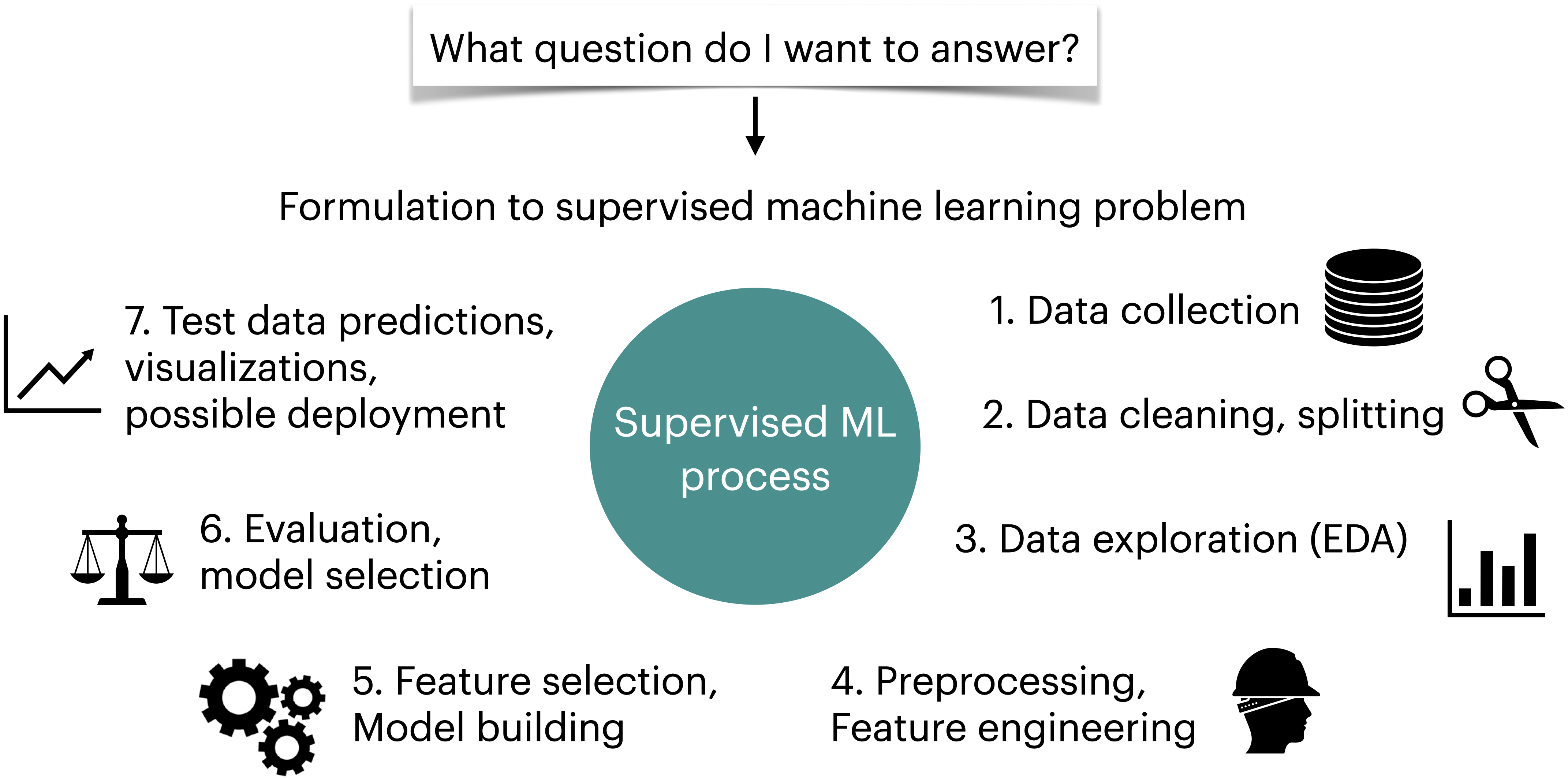
We will build machine learning pipelines in this course, focusing on some of the steps above.
❓❓ Questions for you#
Select all of the following statements which are True (iClicker)#
iClicker cloud join link: https://join.iclicker.com/DAZZ
(A) Predicting spam is an example of machine learning.
(B) Predicting housing prices is not an example of machine learning.
(C) For problems such as spelling correction, translation, face recognition, spam identification, if you are a domain expert, it’s usually faster and scalable to come up with a robust set of rules manually rather than building a machine learning model.
(D) If you are asked to write a program to find all prime numbers up to a limit, it is better to implement one of the algorithms for doing so rather than using machine learning.
(E) Google News is likely be using machine learning to organize news.
V’s Solutions!
A, D, E
(Optional) Surveys#
Please complete the “Getting to know you” survey on Canvas.
Also, please complete the anonymous restaurant survey on Qualtrics here.
We will analyze this data set in the coming weeks.
About this course #
Course learning outcomes#
By the end of this course you’ll be able to answer most of the above questions.
By the end of this course, you will be able to:
Describe supervised learning and its suitability for various tasks.
Explain key machine learning concepts such as classification, regression, overfitting, and the trade-off in model complexity.
Identify appropriate data preprocessing techniques for specific scenarios, provide reasons for their selection, and integrate them into machine learning pipelines.
Develop an intuitive understanding of common machine learning algorithms.
Build end-to-end supervised machine learning pipelines using Python and scikit-learn on real-world datasets.
What we won’t cover#
I’ll give you intuition of different ML algorithms but you won’t be implementing the algorithms on your own.
Instead, we will focus on machine learning fundamentals, preprocessing, and building machine learning pipelines.
Course roadmap (tentative)#
Week 1
ML terminology, decision trees
ML fundamentals
Week 2
KNNs, SVMs with RBF Kernels
Preprocessing
Week 3
More preprocessing: text features
Hyperparameter optimization, optimization bias
Week 4
Naive Bayes
Linear models
Map of ML courses in MDS#
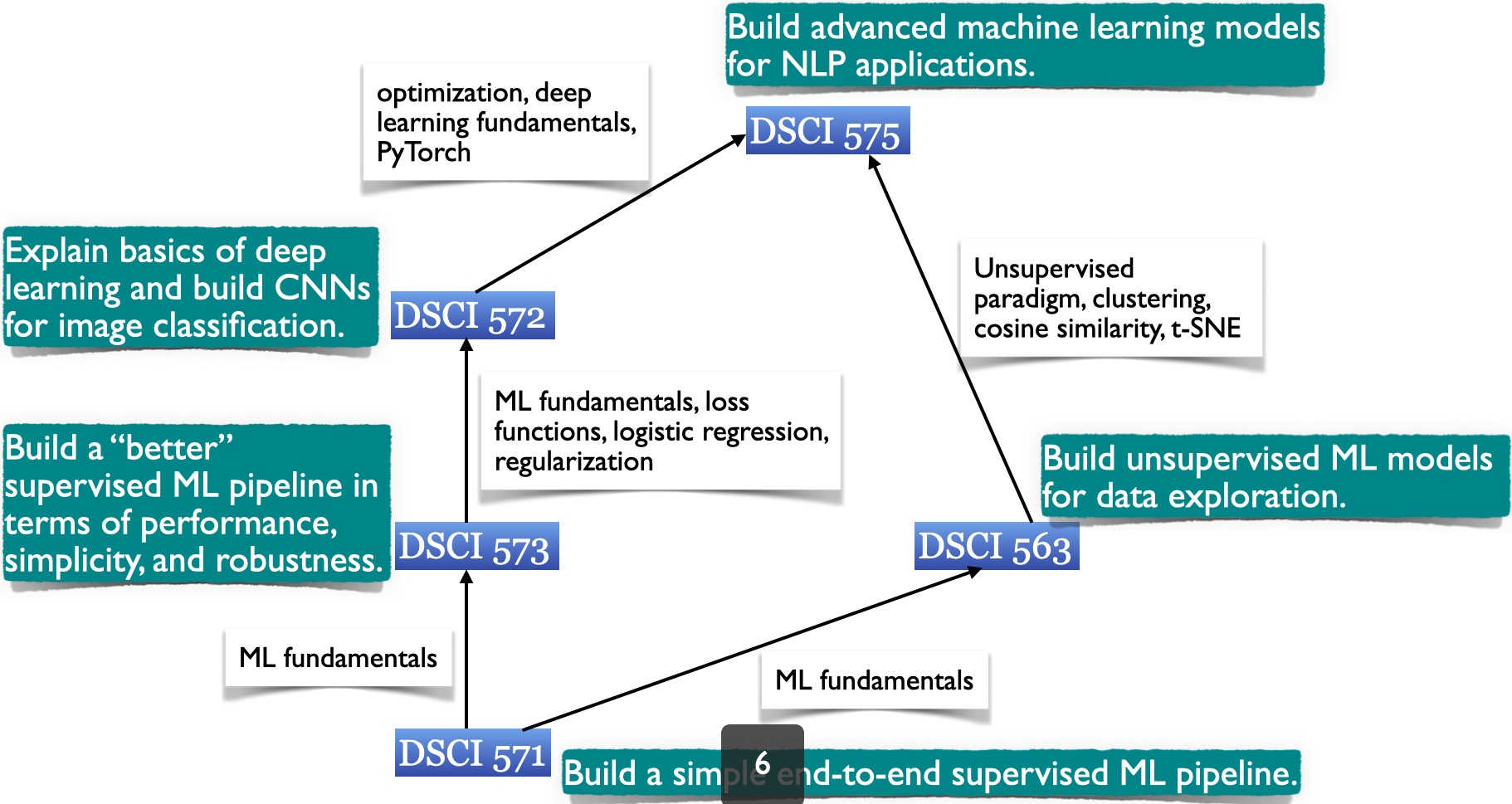
Framework we will be using in this class#
A number machine learning libraries are available.
We will be using
sklearnlibary, which is a popular (more than 56k stars on Github) Machine Learning library for Python.
import IPython
url = "https://scikit-learn.org"
IPython.display.IFrame(width=1000, height=650, src=url)
Checklist for you before the first class#
[ ] Have you created course
condaenvironment on your computer?[ ] Did you watch the course information video?
[ ] Did you watch the assigned pre-recorded lecture videos for lecture 1?
[ ] Have you read the course README carefully, in particular the course communication section?
[ ] Are you on course Slack channel?
[ ] Are you able to access course Canvas shell?
[ ] Are you able to access Gradescope? (If not, refer to the Gradescope Student Guide.)
[ ] (Optional) Did you complete the anonymous restaurant survey on Qualtrics?
[ ] (Optional) Did you complete the Getting to know you survey?
Attention
Note that the first couple of lectures are kind of fundamental and the videos are longish. I’m asking you to pre-watch all recorded videos for the first lecture before class. If this is too much workload for you (I’ll take a poll), I’ll reassess.
Summary#
Machine learning is a different paradigm for problem solving.
Very often it reduces the time you spend programming and helps customizing and scaling your products.
In supervised learning we are given a set of observations (\(X\)) and their corresponding targets (\(y\)) and we wish to find a model function \(f\) that relates \(X\) to \(y\).
Carefully read the course website. Make sure to complete the surveys.
The teaching team is dedicated to facilitating your learning and ensuring your success in the course.
If you have any concerns regarding the format, teaching approach, or any other aspect, please don’t hesitate to get in touch. I will do my best to be accommodating and understanding.
Let’s have fun learning this material together!

